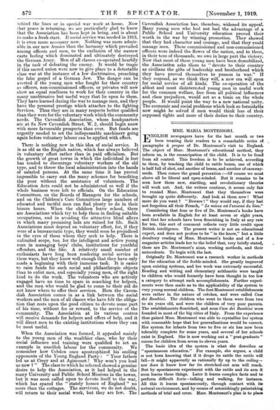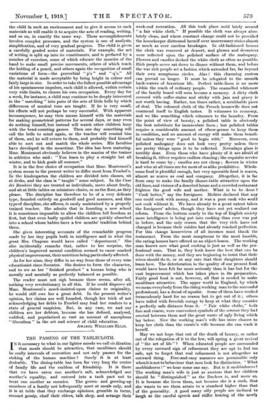MME. MARIA MONTESSORI.
ENGLISH newspapers have for the last month or two been treating their readers to a remarkable series of paragraphs a propos of Dr. Montessori's visit to England. The object of Mme. Montessori's educational method, they inform us, is the emancipation of the child. It is to be freed from all control. This freedom is to be achieved, according to them, by teaching the child to rattle boxes, one of which is half full of shot, and another of beans, and another of carawayseeds. Then comes the grand peroration :—Of course we must above all be liberal and open-minded. But it remains to be seen how these new, startling, and revolutionary theories will work out. And, the writers continue, it seems only fair to remind Mme. Montessori that they themselves were brought up quite differently. And look at them now ! What more do you want ? " Beware ! " they would say, if they had not forgotten all their French, "Le mieux eel ennemi du bien."
Considering that four or five of Dr. Montessori's books have
been available in English for at least seven or eight years, and that her schools have been flourishing in Italy at any rate for ten, this sort of comment reflects very little credit upon British intelligence. The present writer is not an educational expert, and does not profess to be "in the know," but a little desultory reading of Mme. Montessori's books and of a few magazine articles leads her to the belief that, very briefly stated, these are Dr. Montessori's aims, working methods, and their antecedents. To begin with the last.
Originally Dr. Montessori was a research worker in methods
for the education of the feeble-minded. She greatly improved upon existing systems, and her work was extremely successfuL Reading and writing and elementary arithmetic were taught to children who would formerly have been thought in too low a category to attempt such accomplishments. Further experiments were then made as to the applicability of the system to very young normal children. The first Montessori establishments were rather in the nature of creches, and were called Case dei Bambini. The children who went to them were from two to six years old, and were the children of very poor . parents. The establishments flourished, and soon Case dei Bambini were founded in most of the big cities of Italy. From the experience thus gained Mine. Montessori was able to crystallize her system with reasonable hope that her generalizations would be correct. Her system for infants from two to five or six has now been tolerably complete for some years, and several of her schools exist in England. She is now working out a " post-graduate " course for children from seven to eleven years.
The basic idea of the system is what she describes as
" spontaneous education." For example, she argues, a child is not born knowing that if it drops its rattle the rattle will fall—it might apparently as rationally fly up to the ceiling— nor does it know how far its stretched-out arm will reach. But by spontaneous experiment with the rattle and its arm it soon learns these things. Later it learns complex facts and to perform difficult feats—talking and walking, for instance. All this it learns spontaneously, through contact with its natural environment, and by means of astonishingly painstaking methods of trial and error. Mme. Montessori's plan is to place the child in such an environment and to give it access to such materials as will enable it to acquire the arts of reading, writing, and so on, in exactly the same way. These accomplishments involve complex processes, and the system is one of analysis, simplification, and of very gradual progress. The child is given a carefully graded series of materials. For example, the act of .writing is split up into its constituents, and is prefaced by a number of exercises, some of which educate the muscles of the hand to make small precise movements, others of which teach the holding of a pencil, and others again the recognition of small variations of form—the proverbial " p's " and " q's." All the material is made acceptable by being bright in colour and fairly large in size. In order to take the fullest possible advantage of his spontaneous impulses, each child is allowed, within certain very wide limits, to choose his own occupation. Every day for a week, for instance, a child may continue to be deeply interested in the " matching " into pairs of the sets of little bells by which differences of musical tone are taught. If he is very small, his efforts will not perhaps be very successful. With apparent inconsequence, he may then amuse himself with the materials for making geometrical patterns for several days, or may even do nothing himself, but instead will watch other children busy with the bead-counting games. Then one day something will call the bells to mind again, or the teacher will remind him of them, and he will return to them, and probably find himself able to sort out and match the whole series. His faculties have developed in the meantime. The idea has been maturing. Mine. Montessori obviously believes in the maxim of the trainer in athletics who said : " You learn to play a straight bat all winter, and to kick goals all summer."
It is in the free choice of occupation that Mme. Montessori's system seems to the present writer to differ most from Froebel's. In the kindergarten the children are divided into classes, sit at desks, and the class is " taught " some subject. In the Case dei Bambini they are treated as individuals, move about freely, and sit at little tables on miniature chairs, or on the floor, as they please. The discipline has therefore to be of a very delicate type, founded entirely on goodwill and good manners, and this type of discipline, she affirms, is easily maintained by a properly trained teacher. She admits that in founding a new school it is sometimes impossible to allow the children full freedom at first, but that even badly spoiled children are quickly absorbed into a school whose babies have a few months' tradition behind them.
She gives interesting accounts of the remarkable progress made by her tiny pupils both in intelligence and in what the great Mrs. Chapone would have called " deportment." She also incidentally remarks that, rather to her surprise, the children's improved mental condition seemed to cause marked physical improvement, their nutrition being particularly affected.
As for her aims, they differ in no way from those of every wise educationist since Socrates. She desires to form the character, and to see as her " finished product " a human being who is morally and mentally as perfectly balanced as possible.
The reader must not sigh because there seems, after all, nothing very revolutionary in all this. If he could disprove all Mine. Montessori's much-insisted-upon claims to originality, he would still owe her a great debt. In the present writer's opinion, her claims are well founded, though her trick of not acknowledging her debts to Froebel may lead her readers to a state of general suspicion. But, in any case, we and our children are her debtors, "because she has defined, analysed, codified, and popularized so vast an amount of amorphous " liberalism " in the art and science of child education.
AMABEL W
JT.T T 1MS-ELLIS.







































 Previous page
Previous page